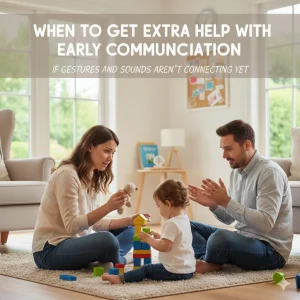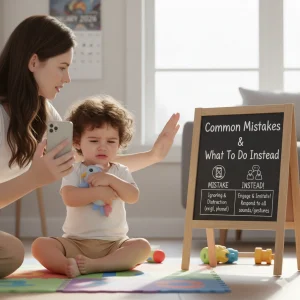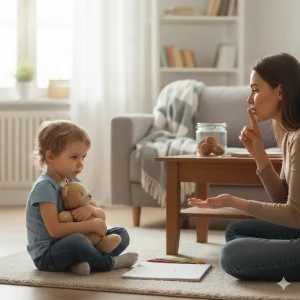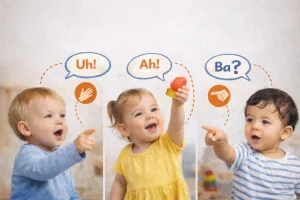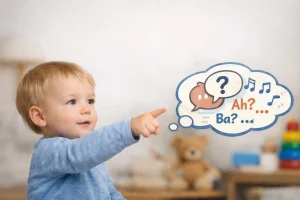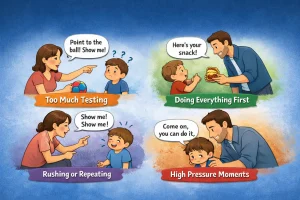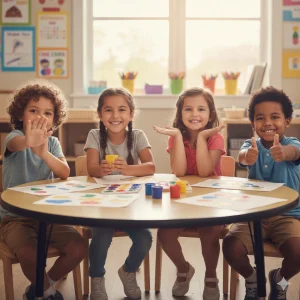What If My Toddler Talks but Doesn’t Communicate Clearly?
By Rajini D
Last Updated: August 19, 2025
Is your toddler saying words but still not really communicating? Maybe they talk a lot, but you’re not always sure what they mean—or they repeat phrases without using them to ask for things or respond. If this sounds familiar, you’re not alone. Many parents worry when their toddler talks but doesn’t communicate clearly. It can be confusing to see a child speaking but not expressing their needs, thoughts, or feelings the way you’d expect.
Free Speech Help for Kids
Concerned about speech delays? Book a free consultation with our expert speech therapist and get guidance tailored to your child’s needs.
Is It Normal If My Toddler Talks but Doesn’t Communicate Well?
Understanding the Difference Between Talking and Communicating
It can be confusing when your toddler is saying words, maybe even full sentences, but still doesn’t seem to communicate clearly. You’re not alone in wondering why your toddler is talking but not communicating in a meaningful way.
Here’s the key difference:
- Talking means using words or sounds.
- Communicating means using those words to share thoughts, needs, or emotions with others.
So a child might be talking—repeating phrases, naming things, or echoing words—but still struggle to express what they want or how they feel. That’s why speech and communication aren’t always the same thing. A toddler may have learned to talk but not yet learned how to use those words to connect with others.
And that’s okay—for a while. But it’s important to understand the signs when this pattern lasts too long.
When Unclear Speech Is a Normal Part of Development
If you’re asking, “Is unclear speech normal for toddlers?” — the short answer is: yes, to an extent.
Many toddlers go through a phase where they’re learning to shape sounds, combine words, and speak smoothly. It’s common for 2-year-olds to mispronounce words, skip sounds, or use phrases that are hard for outsiders to understand. In fact:
- Most 18-month-olds can say about 10–20 words, but they aren’t always clear.
- By age 2, you might understand about half of what they say.
- By age 3, strangers should understand most of their speech.
So, if your child is under 3 and trying to speak—even if their words are unclear—it can still be part of typical development. But clarity usually improves with age and practice.
Red Flags to Watch For
While some speech confusion is expected, there are certain speech delay warning signs that parents should not ignore.
Watch for these red flags:
- Your toddler talks but is not understood by familiar adults after age 2.5.
- They use a lot of scripted or repeated phrases, but not their own words.
- Your child can name objects but doesn’t ask for help or respond to questions.
- They talk but avoid eye contact or social interaction.
- You notice frustration, tantrums, or pulling your hand instead of asking for things.
Why Is My Toddler Talking but Not Communicating Clearly?
Common Causes of Unclear Speech in Toddlers
If your toddler is saying words but their speech sounds mumbled, jumbled, or just hard to understand, you’re not alone. Many parents worry about toddler unclear speech, especially when their child seems to know words but struggles to speak them clearly.
Here are some common reasons behind toddler speech clarity issues:
- Muscle coordination: Speaking requires tiny, well-timed movements of the lips, tongue, and jaw. Some toddlers are still developing these skills.
- Learning sounds: Certain sounds like “r,” “l,” or “th” are harder for young children. Mispronunciations are common in early speech.
- Limited practice: If your child isn’t exposed to much conversation, songs, or stories, their speech clarity may develop more slowly.
- Ear infections or hearing difficulties: If your toddler can’t hear words clearly, it’s harder for them to speak them correctly.
It’s okay if speech isn’t perfect yet—but if unclear speech continues past age 3, it’s a good idea to look closer.
Also read: What is the Relation between Communication, Speech and Language? | Speech and Language Therapy
Communication Delay vs Speech Delay — Know the Difference
Many parents ask: Is my child just late in speaking, or is it something more?
Understanding the difference between speech delay and communication delay in toddlers can help:
- A speech delay means your child has trouble forming sounds and words clearly. They may understand you well but can’t express themselves properly.
- A communication delay means your child may not use words or gestures to interact, even if they can speak some words.
Know more: How to Help a Child with Speech Delay at Home – Easy Tips
For example:
- A child with a speech delay might say “wawa” for “water” but still point to the cup or respond when you ask questions.
- A child with a communication delay might repeat “water” but not ask for it or respond to your request.
In short, speech is how we say things, and communication is how we connect with others. Some children experience both delays, and that’s where professional support can make a big difference.
Other Factors That Can Affect Clear Speech
Sometimes, other underlying challenges can impact your toddler’s ability to speak clearly or communicate well. These include:
- Hearing issues: Even mild hearing loss from repeated ear infections can affect speech development.
- Oral-motor delay: Some toddlers have trouble coordinating the muscles needed for speech.
- Bilingual home: Children growing up with more than one language may mix sounds or take longer to sort them out—this is usually temporary and not a cause for concern.
- Autism signs: Some children on the autism spectrum may talk but use language in a way that isn’t social—like repeating the same words or avoiding eye contact.
What to Do If Your Toddler’s Speech Isn’t Clear
Simple Tips to Encourage Clear Communication at Home
If your toddler is saying words but you’re still having a hard time understanding them, don’t worry—there are easy ways you can help right at home. With a little patience and practice, you can gently help your toddler with unclear speech while boosting their confidence too.
Here are a few simple things that support toddler language development every day:
- Talk slowly and clearly: Use short sentences and emphasize key words.
- Repeat and expand: If your child says “ball,” you can respond, “Yes, a red ball!”
- Use everyday routines: Talk during snack time, bath time, or while getting dressed—this helps build vocabulary naturally.
- Label everything: Point to objects and name them out loud—“This is a spoon. Spoon for eating.”
- Use gestures and pictures: Visuals help connect words to meaning, especially when speech is unclear.
You don’t need fancy tools—just your voice, attention, and a bit of repetition can go a long way.
How to Talk So Your Toddler Understands and Responds
Sometimes, your child may hear you but not respond clearly, or they may seem unsure how to use words in the right way. These speech therapy tips can help your toddler not only speak but also understand and express themselves better.
Try these:
- Get down to eye level: This helps your child focus on your mouth and face as you speak.
- Pause and wait: After asking a question, give your child a few seconds to process and respond.
- Give choices: Instead of saying, “What do you want?” ask, “Do you want juice or milk?” This makes it easier for them to answer.
- Model—not correct: If they say “nana” for “banana,” simply repeat the correct word in a positive way—“Yes, banana!”
Avoiding Pressure — Keeping It Natural and Fun
When speech isn’t clear, it’s tempting to correct your child or push them to “say it right.” But pressure often leads to frustration—for both of you. The best way to provide toddler speech support at home is to make language part of joyful, everyday moments.
Here’s how to make speech fun and stress-free:
- Play together: Use pretend play, animal sounds, or action songs to get your child talking without them realizing it’s “practice.”
- Follow their lead: Let them pick the toy or game and talk about what they’re doing.
- Celebrate effort: Even small sounds or gestures are steps in the right direction—cheer them on!
Conclusion
If your toddler talks but doesn’t communicate clearly, don’t wait and wonder. Early speech development support can really help. Simple activities at home are a great start—but expert guidance can make progress faster and easier. At Wellness Hub, our speech therapists work with toddlers every day to boost their clarity and confidence through fun, play-based sessions. If you’re looking for toddler speech help, we’re here for you. Book a free consultation today and take the first step toward better communication.
Frequently Asked Questions:
1. Why does my toddler talk but not communicate clearly?
Some toddlers can say words but don’t use them to share needs, feelings, or ideas. This may be due to a speech delay, communication delay, or simply developing at their own pace.
2. Is unclear speech normal in toddlers?
Yes, unclear speech is common in toddlers under age 3. But if your child is hard to understand after age 2.5 or doesn’t try to communicate, it’s good to check with a speech therapist.
3. What’s the difference between speech delay and communication delay?
A speech delay means your child struggles with saying words clearly. A communication delay means they may not use words or gestures to connect, even if they can speak.
4. Should I worry if my toddler talks a lot but doesn’t make sense?
If your toddler uses many words but can’t express what they want or doesn’t respond clearly, it might be a sign of a communication delay or early language issue.
5. How can I help my toddler with unclear speech at home?
You can speak slowly, name everyday objects, repeat words, and use simple sentences. Talking during daily routines is a great way to support toddler speech development.
6. At what age should a toddler’s speech be clear?
By age 2, parents should understand about 50% of what a toddler says. By age 3, strangers should understand most of it. If not, it may be time to seek support.
7. Can a toddler talk but still have autism?
Yes. Some toddlers with autism can speak but don’t use language in a social way. They may repeat words, avoid eye contact, or not respond to their name.
8. When should I see a speech therapist for my toddler?
If your toddler talks but isn’t understood, doesn’t use words to connect, or shows signs of delay after age 2, a speech therapist can help with early support and guidance.
9. Does growing up in a bilingual home affect speech clarity?
It’s normal for bilingual toddlers to mix languages or take more time to speak clearly. This is usually temporary and not a cause for concern unless there are other delays.
10. Where can I get speech therapy for toddlers online?
You can book a free consultation with Wellness Hub and get expert help from child-friendly speech therapists, all from the comfort of your home.
About the Author:
Shravanaveena Gajula
M.Sc ., Speech and Language Pathology (5+ years of experience)
Shravanaveena Gajula is a dedicated Speech-Language Pathologist with a BASLP and an M.Sc in Speech and Language Pathology. With experience spanning multiple settings, including Wellness Hub , Veena specializes in a wide range of disorders from developmental issues in children to speech and language assessments in adults. Her expertise includes parent counseling, managing speech sound and fluency disorders, and creating individualized therapy programs. Veena is also PROMPT certified and an author of several insightful blogs on speech and language pathology, aiming to educate and assist caregivers in supporting their loved ones.
Book your Free Consultation Today
Parent/Caregiver Info:
Client’s Details:
* Error Message
